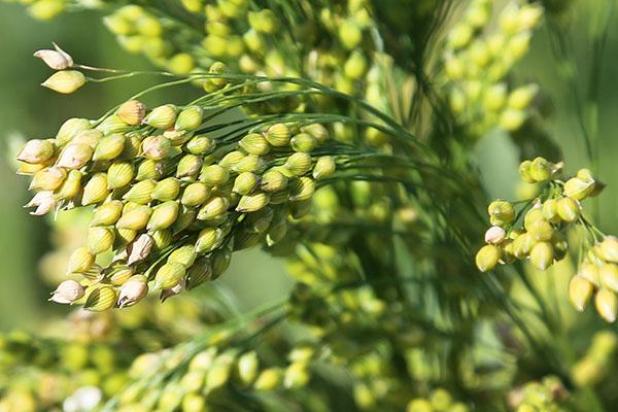
Colorado produces over half of the total millet grown in the United States, and the newly-formed High Plains Millet Association aims to increase and sustain the industry through alternative markets, improved varieties and funding from a potential market order. —photo by Ken Mostek
Millet—not just for the birds?
When you hear the word millet, you think of birdseed. But this small grain has big potential to move up the pecking order, and a new organization has formed in an effort to make that happen.
High Plains Millet Association was organized March 11, 2017, with a mission to “provide sustainability to the millet industry through research, production and marketing.”
President Chris Stum of Towner, Colorado, is excited for the possibilities.
A key goal for HPMA, said Stum, is to expand the market for millet. “Think beyond bird food!” he stressed to producers. “There are other markets out there.”
One of those markets is the human consumption industry. The nutritional value of proso millet is much like that of wheat; however, it contains no gluten. That characteristic alone could give millet a place in the expanding market for gluten-free food. It can be used by itself or in combination with other grains for making bread, flour, pastas and a couscous-like product.
A very small fraction of U.S. millet goes into the domestic food market, and Stum would like to see that grow. He’d also like to see more exports of the grain. It is a traditional food in places like Russia, Germany and China.
Millet can also be used for brewing beer, with some Colorado and Nebraska companies already experimenting with it.
In addition to birdseed, millet has the potential to expand in the animal feed industry, including feed for dogs, hamsters, poultry, swine, sheep and cattle.
Stum also mentioned biofuel as an alternative use for millet. Proso millet contains a similar starch content as corn, the grain typically used for ethanol.
On the research side of things, Stum said HPMA wants to see new millet varieties developed. He’d also like to see research help increase traits that millet markets are looking for.
There is no full-time proso millet breeding and genetics program in the U.S. The Alternative Crops Breeding Program at the University of Nebraska breeds proso millet only part time, due to lack of funding.
Five proso millet varieties — Huntsman, Sunrise, Sunup, Earlybird and Horizon — are the only varieties available to Colorado millet producers, and all were developed by the University of Nebraska decades ago. The most recent commercial millet variety, Horizon, is 14 years old.
HPMA hopes that new varieties will increase production and improve yield and quality.
1939 law needs amended for millet to receive market order, funding
About 90 millet producers, handlers, processors and industry representatives attended the first annual meeting of HPMA Dec. 8, 2017, at Northeastern Junior College in Sterling, Colorado.
They heard from Colorado Commissioner of Agriculture Don Brown of Yuma. He told attendees that the Colorado Agricultural Marketing Act of 1939 would need to be amended to include millet as an agricultural commodity so producers can vote in a referendum to approve a millet marketing order and assessment to fund education, research and promotion programs.
Products specifically excluded from the 1939 list of marketable agricultural commodities include sugar beets, timber and timber products, oats, malting barley, barley, hops, rice milo and other feed grains. Brown said millet is included in “other feed grains.”
The Colorado Department of Agriculture is proposing legislation to amend the 1939 law. If the Legislature approves the change to the law, hearings and a referendum of producers can be conducted by CDA, which administers Colorado marketing orders (such as wheat, corn, sunflower and potato).
A market order would allow producers of millet to work together to solve marketing problems and conduct programs and research that would be impossible for individual producers to accomplish. Market orders provide the structure and resources for programs that farmers could not do alone.
The full article is available for free in our special grain section. Click here to read it all.
